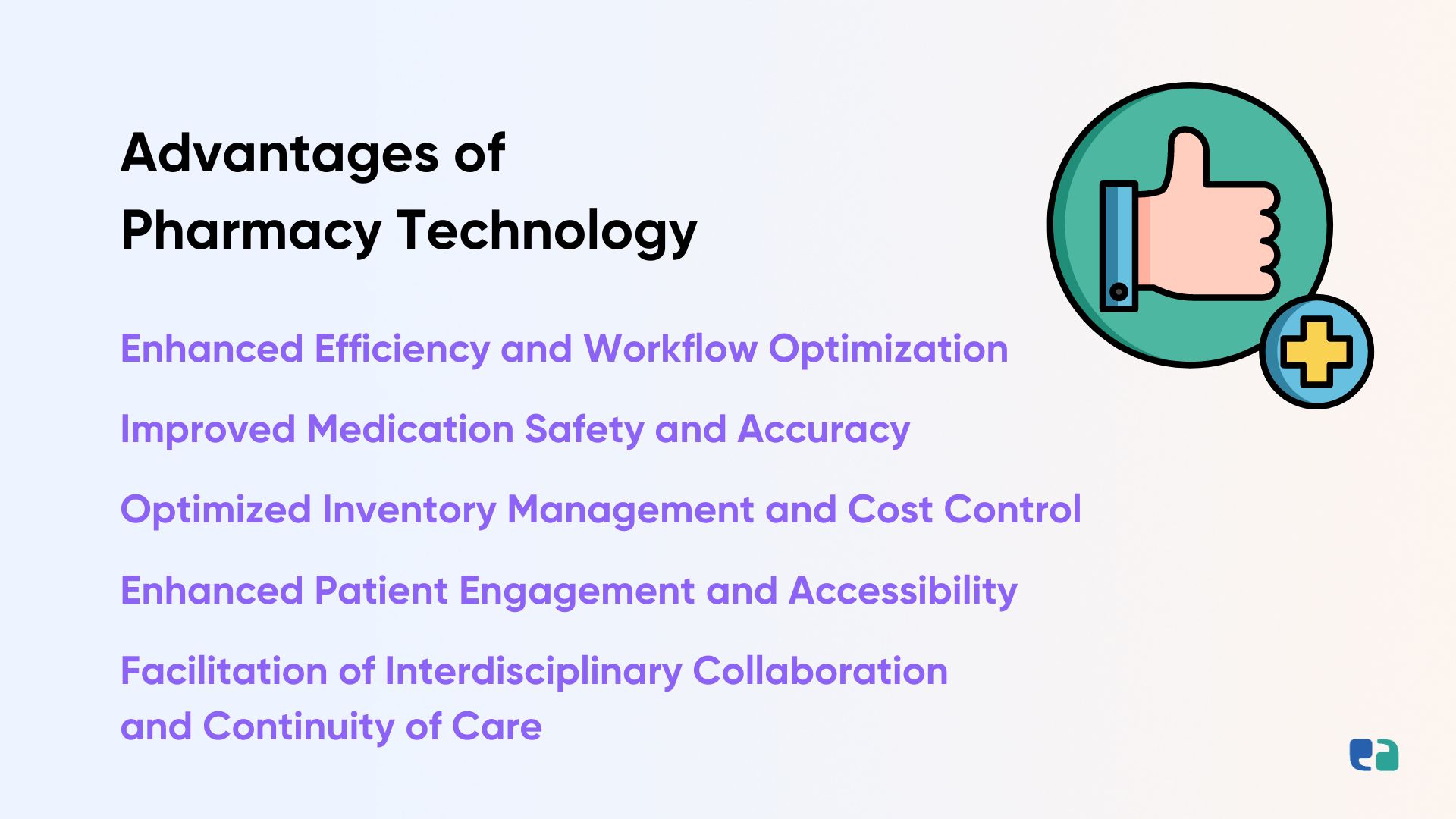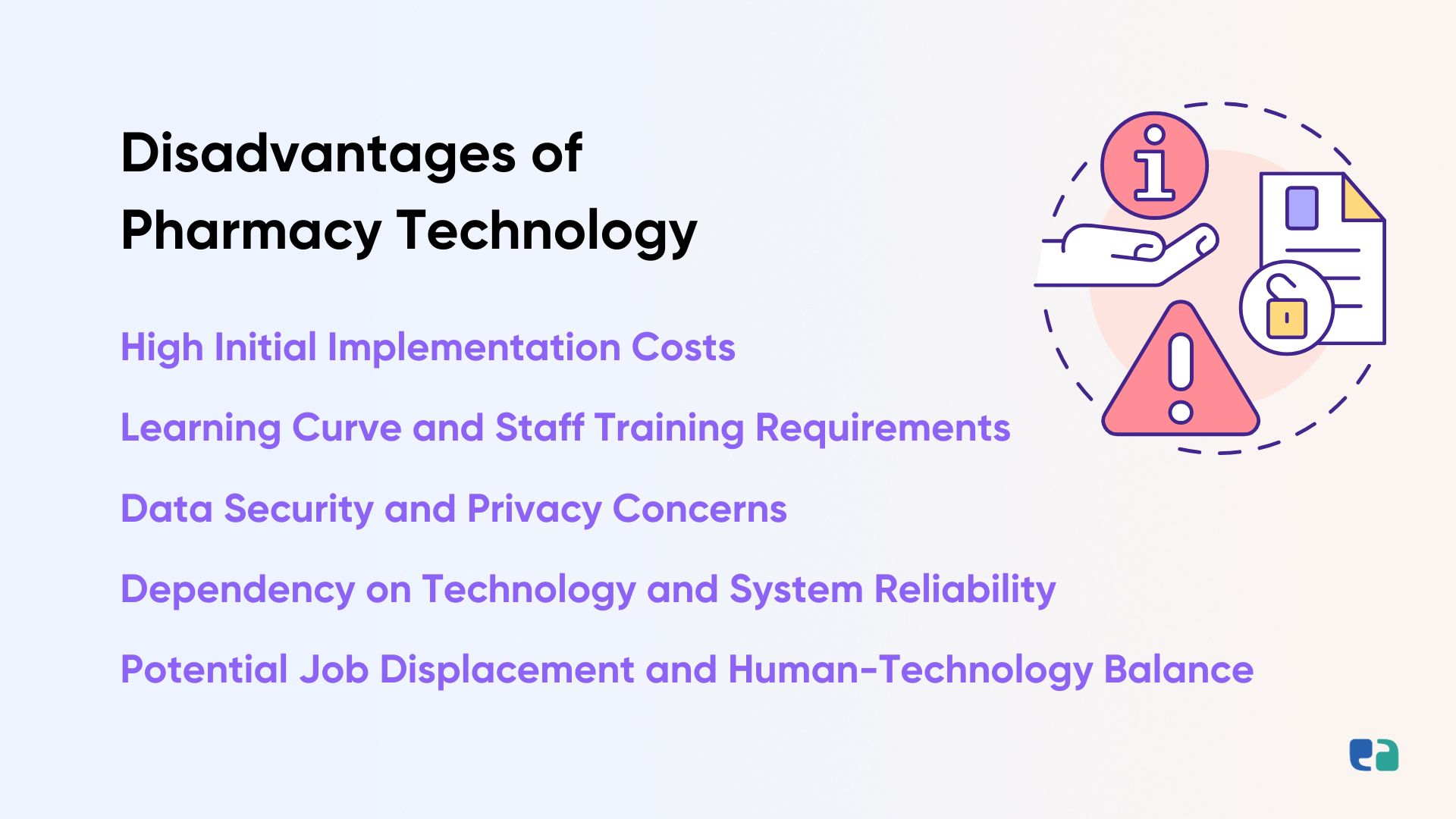Decoding Pharmacy Technology – The Pros and Cons

7 months ago
The world of pharmacy services has been transformed by the power of technology!
From electronic health records to automated prescription dispensing systems, technology has revolutionized the way pharmacies operate.
With all the benefits that come with these advancements, there are still some challenges that need to be considered.
So, let's dive deeper into the exciting world of pharmacy technology and take a closer look at its amazing advantages and potential drawbacks.
Get ready for an insightful journey!
Advantages of Pharmacy Technology

- Enhanced Efficiency and Workflow Optimization
Have you ever wondered how pharmacies manage to fill prescriptions so quickly and efficiently?
Well, it's all thanks to the incredible power of pharmacy technology!
With automated prescription dispensing systems, robotic medication dispensers, and barcode scanning technologies, pharmacies can streamline their processes and optimize their workflow efficiency like never before.
This means less time wasted, fewer errors, and more personalized care for patients.
By automating repetitive tasks, pharmacies can focus on what really matters - delivering top-notch healthcare services to their valued customers.
- Improved Medication Safety and Accuracy
Did you know that pharmacy technology plays a crucial role in ensuring patient safety and well-being?
With electronic prescribing systems, illegible prescriptions are a thing of the past.
With clinical decision support systems that provide real-time alerts and notifications, potential drug interactions or contraindications can be identified before they become a problem.
Not only that, but barcode scanning and verification systems help to guarantee the accuracy of medication dispensing, reducing the likelihood of errors and improving medication adherence among patients.
It's amazing how technology can make such a big difference in healthcare, isn't it?
- Optimized Inventory Management and Cost Control
Are you looking for ways to enhance the efficiency of your pharmacy operation?
If yes, you might want to consider leveraging technology to optimize your inventory management.
With advanced pharmacy management software, you can easily track your medication stock levels, automate your replenishment processes, and implement strategic inventory forecasting algorithms.
By doing so, you can keep your stockouts to a minimum, reduce excess inventory, and negotiate favorable pricing with your suppliers, which ultimately leads to significant cost savings and improved profitability.
Don't miss out on the opportunity to streamline your pharmacy's inventory management – give it a try today!
- Enhanced Patient Engagement and Accessibility
The world of healthcare has undergone a massive transformation.
Thanks to the proliferation of telepharmacy services, mobile health apps, and online medication portals, patients can now access healthcare services and interact with pharmacies like never before.
With the help of secure digital platforms, patients can refill their prescriptions, access medication information, and even have virtual consultations with pharmacists without leaving the comfort of their homes.
This not only makes life easier for patients but also helps improve medication adherence and therapeutic outcomes, especially for those who live in remote or underserved areas.
It's a win-win situation for everyone!
- Facilitation of Interdisciplinary Collaboration and Continuity of Care
Have you ever wondered how healthcare providers coordinate care and make informed decisions about your health?
Pharmacy technology is the key!
It helps pharmacists access your comprehensive medical history, including medication records, lab results, and treatment plans through electronic health records (EHRs).
This makes it easier to provide seamless care irrespective of where you are receiving treatment.
By promoting interoperability between healthcare providers and systems, pharmacy technology ensures that you receive integrated, patient-centered services.
So, next time you visit your pharmacy, remember the technology behind the scenes that's working hard to make sure you receive the best possible care!
Disadvantages of Pharmacy Technology

- High Initial Implementation Costs
Pharmacy technology can work wonders for streamlining operations and improving patient care.
However, the cost of implementing and integrating these systems can be a major hurdle for many pharmacies, especially smaller independent ones.
From buying hardware and software licenses to training staff and upgrading infrastructure, the upfront investment needed for adopting pharmacy technology solutions can put a strain on finances and act as a barrier to entry for some pharmacies.
- Learning Curve and Staff Training Requirements
Today, pharmacy technology has become an indispensable tool to provide seamless and efficient services to patients.
But, we cannot ignore the fact that many employees, especially those who are not tech-savvy or older, find it challenging to cope with new technology implementations.
It is crucial to provide comprehensive staff training programs and ongoing support initiatives to ensure that all team members possess the necessary skills and competencies to leverage technology tools effectively.
After all, with the right training and support, every member of the pharmacy staff can become a tech rockstar!
- Data Security and Privacy Concerns
As technology advances, the way we manage patient health information has drastically changed.
However, with this evolution comes the risk of data security breaches, privacy violations, and regulatory compliance issues.
Pharmacies need to be extra cautious and implement strong cybersecurity measures, encryption protocols, and access controls to safeguard sensitive patient data and prevent unauthorized access or data breaches.
Furthermore, it is crucial to adhere to strict regulatory frameworks such as the Health Insurance Portability and Accountability Act (HIPAA) to protect patient confidentiality and maintain trust in pharmacy services.
By prioritizing the security and privacy of patient's data, pharmacies can provide better care and build long-lasting relationships with their customers.
- Dependency on Technology and System Reliability
Pharmacy technology is a game-changer when it comes to efficient operations and top-notch patient care.
But with great power comes great responsibility, and pharmacies need to be prepared for the unexpected.
Technical glitches, software malfunctions, or hardware failures can cause chaos, putting medication dispensing processes and patient safety at risk.
That's why pharmacies must have a solid contingency plan in place, with redundancy measures and disaster recovery protocols to ensure uninterrupted service and quality care, no matter what comes their way.
- Potential Job Displacement and Human-Technology Balance
As pharmacy processes become increasingly automated and digitized, many people worry about the possibility of human workers being replaced and traditional pharmacy roles being lost.
While technology can certainly make certain tasks easier and faster, it can never fully replace the expertise, compassion, and critical thinking skills of human pharmacists and pharmacy technicians.
Striking a balance between technology-driven automation and human-centered care is crucial to ensure that pharmacy professionals can continue to provide personalized, patient-focused services that lead to the best possible outcomes for all.
Pharmacy technology is a game-changer, no doubt about it. It brings with it endless possibilities for innovation and efficiency, paving the way for patient-centered care like never before.
However, it's not all sunshine and rainbows - the challenges and complexities that come with it are equally daunting and require careful consideration and strategic planning.
That being said, by leveraging the advantages of pharmacy technology and taking steps to mitigate its risks and limitations, pharmacies can position themselves as pioneers of healthcare innovation, delivering unparalleled value to patients, providers, and stakeholders alike.
